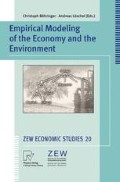Abstract
This paper examines the determinants of the substantial decline of West German production-related carbon intensity in the face of falling energy prices. A computable general equilibrium model is used to determine the simulated effects of observed changes of world energy prices and domestic energy policy on the sectoral patterns of carbon emissions energy consumption output value added and other indicators of structural change. The structural changes not accounted for by energy prices and energy policy are attributed to changing patterns of productivity growth in Germany and the rest of the world (ROW) and changing patterns of ROW demand. Weights on these driving forces are selected by least squares. One key finding is that the contribution of ROW productivity and demand patterns to emission-relevant structural change unaccounted for by energy prices and energy policy is just under 30%. The remainder is split almost equally among patterns of domestic autonomous energy efficiency improvement and domestic labor efficiency patterns.
Access this chapter
Tax calculation will be finalised at checkout
Purchases are for personal use only
Preview
Unable to display preview. Download preview PDF.
References
Ang, B.W. (1994), Decomposition of Industrial Energy Consumption: The Energy Intensity ApproachEnergy Economics16, 83–92.
Boyd, G., J.F. McDonald, M. Ross, and D.A. Hanson (1987), Separating the Changing Composition of U.S. Manufacturing Production from Energy Efficiency ImprovementsThe Energy Journal8, 77–95.
Berman, E., J. Bound, and S. Machin (1998), Implications of Skill-Biased Technological Change: International EvidenceQuarterly Journal of EconomicsCXIII, 1245–1279.
Burda, M. and B. Dluhosch (2000)Fragmentation Globalization and Labour MarketsCESifo Working Paper No. 352, Munich.
Bumiaux, J.-M., J.P. Martin, G. Nicoletti, and J. Oliveira-Martins (1992)GREEN — A Multi-Sector Multi-Region General Equilibrium Model for Quantifying the Costs of Curbing CO 2 Emissions : A Technical Manual, OECD Working Paper No. 116, Paris.
Carruth, A. and C. Schnabel (1993), The Determination of Contract Wages in West GermanyScandinavian Journal of Economics95, 297–310.
De Bruyn, S. (2000)Economic Growth and the EnvironmentDordrecht.
EUROSTAT (1992)National Accounts ESVG: Input-Output Tables 1985Luxembourg.
IEA (1995)Energy Prices and TaxesParis.
Jones, R.W. and H. Kierzkowski (1990), The Role of Services in Production and International Trade: A Theoretical Framework, in: Jones, R.W. and A.O. Krueger (Eds.)The Political Economy of International Trade: Essays in Honor of Robert E. Baldwin,Cambridge, Oxford, 31–48.
Kemfert, C. and H. Welsch (2000), Energy-Capital-Labour Substitution and the Economic Effects of CO2Abatement: Evidence for GermanyJournal of Policy Modeling22, 641–660.
Mayer, H. and C. Stahmer (1989)Energy Consumption and Sulphur Dioxide Emissions in the Federal Republic of Germanymimeo, Wiesbaden.
Minford, P., J. Riley, and E. Nowell (1997), Trade, Technology and Labour Markets in the World Economy, 1970–90: A Computable General Equilibrium AnalysisJournal of Development Studies34, 1–34.
Saeger, S.S. (1997), Globalization and Deindustrialization: Myth and Reality in the OECDWeltwirtschaftliches Archiv133, 549–608.
Statistisches Bundesamt (1999)Fachserie 18: Volkswirtschaftliche Gesamtrechnungen http://www.zr.statistik-bund.de/zeitreih
Unander, F., S. Karbuz, L. Schipper, M. Khrushch, and M. Ting (1999), Manufacturing Energy Use in OECD Countries: Decomposition of Long-Term TrendsEnergy Policy27, 769–778.
Welsch, H. and C. Ochsen (2001), Dismantling of Nuclear Power in Germany: Sectoral and Macroeconomic EffectsEnergy Policy29, 279–289.
WTO (2000)International Trade Statistics 2000Geneva.
Author information
Authors and Affiliations
Editor information
Editors and Affiliations
Rights and permissions
Copyright information
© 2003 Springer-Verlag Berlin Heidelberg
About this paper
Cite this paper
Welsch, H. (2003). Trade, Technology, and Carbon Emissions: A CGE Analysis for West Germany. In: Böhringer, C., Löschel, A. (eds) Empirical Modeling of the Economy and the Environment. ZEW Economic Studies, vol 20. Physica, Heidelberg. https://doi.org/10.1007/978-3-642-57415-3_4
Download citation
DOI: https://doi.org/10.1007/978-3-642-57415-3_4
Publisher Name: Physica, Heidelberg
Print ISBN: 978-3-7908-0078-4
Online ISBN: 978-3-642-57415-3
eBook Packages: Springer Book Archive

